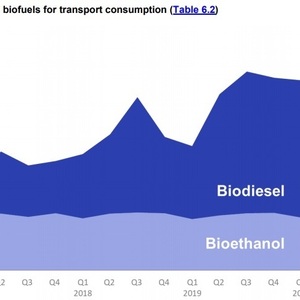Biofuel accounts for record 5.8% of UK transportation fuel in Q1

September 18, 2020
BY Erin Voegele
The U.K. consumed 645 million liters (170.39 million gallons) of transportation biofuels during the first quarter of 2020, up 53 percent when compared to the same period of 2019, according to data released by the U.K. Department for Business, Energy and Industrial Strategy on Sept. 10.
Ethanol consumption was at 179 million liters, up 2.6 percent. Biodiesel consumption was at 466 million liters, up 89 percent.
According to the BEIS, biodiesel accounted for 72 percent of U.K. transportation biofuel consumption during the three-month period. Ethanol accounted for the remaining 28 percent.
Advertisement
Ethanol accounted for 4.7 percent of gasoline, during the first quarter, up from 4.3 percent during the same period of 2019. Biodiesel accounted for 6.4 percent of diesel consumption, up from 3.5 percent during the same period of last year. On a combined basis, ethanol and biodiesel accounted for 5.8 percent of transportation fuel use, up 3.8 percent from the first quarter of 2019 and a new record share, according to the BEIS.
Additional information is available on the BEIS website.
Advertisement
Related Stories
In a rapidly evolving energy landscape, the 41st International Fuel Ethanol Workshop & Expo will return June 9–11 to the CHI Health Center in Omaha, Nebraska. The event is recognized as the largest and longest-running ethanol conference in the world.
The U.S. EPA on April 11 reported that 1.82 billion RINs were generated under the RFS in March, down from 1.93 billion generated during the same month of 2024. Approximately 5.34 billion RINs were generated during the first quarter of 2025.
The U.S. EPA on April 17 published updated SRE data showing that five new SRE petitions have been filed under the RFS during the past month. According to the agency, 161 SRE petitions are currently pending,
The Iowa Biodiesel Board and Iowa Soybean Association on April 11 issued a statement expressing deep appreciation to Gov. Kim Reynolds for her biofuels advocacy. Reynolds on April 11 announced that she will not seek another term.
Metro Ports on April 8 announced significant environmental milestone in its voluntary efforts to reduce greenhouse gas emissions. By switching to renewable diesel, the organization reduced its carbon emissions by 85%.
Upcoming Events










